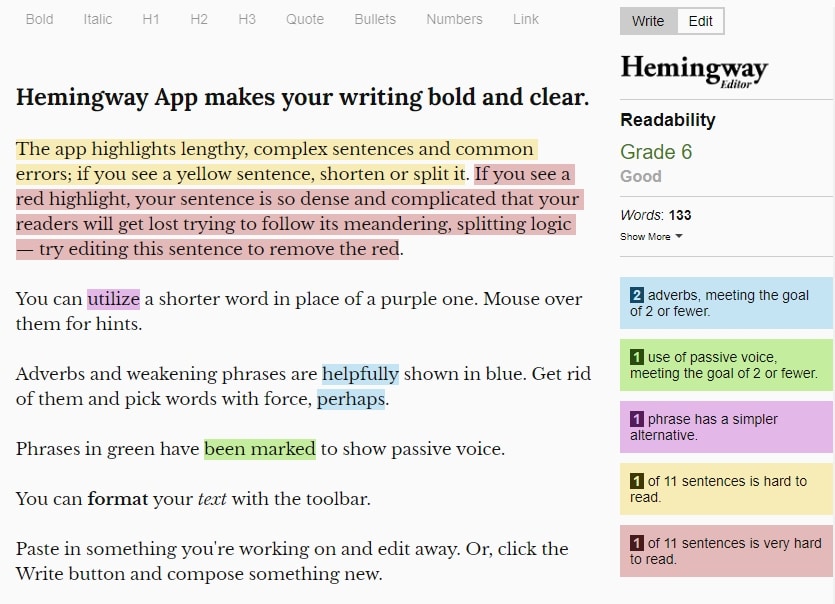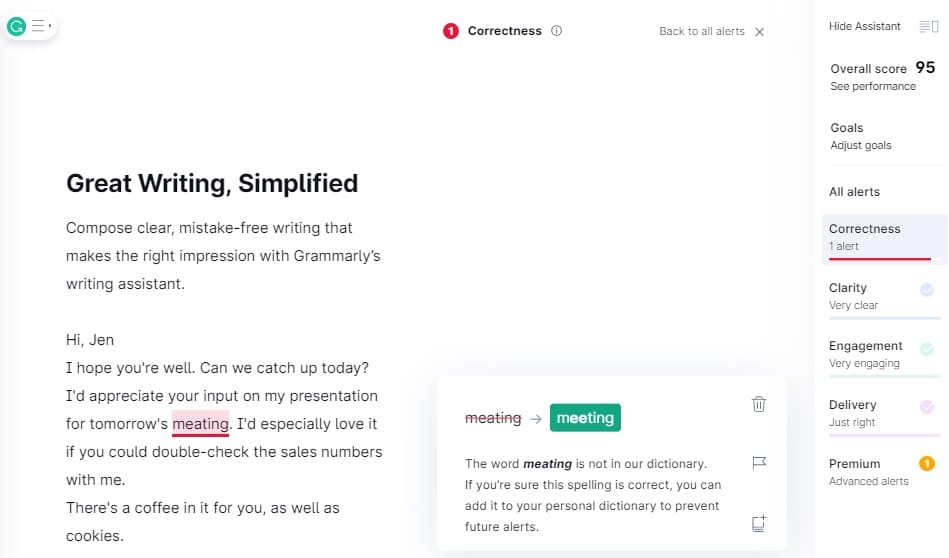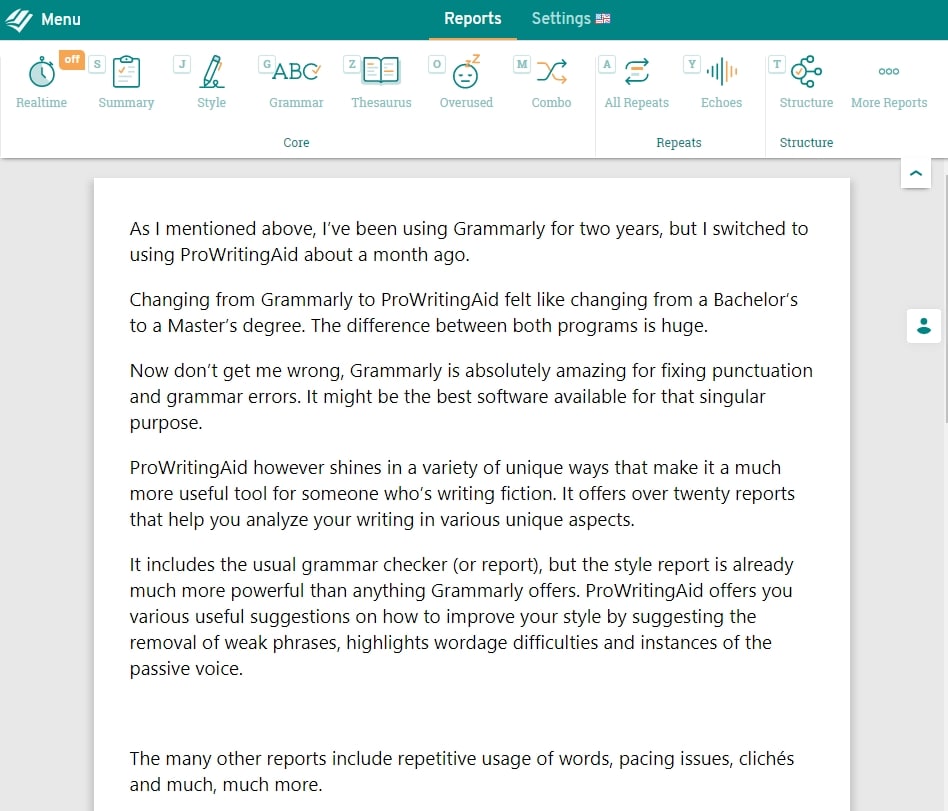As a writer, the two most important things you have to do are writing a lot and reading a lot. The advent of the internet changed many things, one of them the profession of being a writer. There are now many writing tools available that can make writing just a tad bit easier for you.
In this article I want to introduce some of these tools, but also want to talk a bit about other useful techniques. Today, software exists for pretty much anything. In this section I want to share three writing tools I used and which helped me a lot to become a better writer.
Writing Tools – Hemingway
This simple website was an absolute game changer for me. Hemingway shows you four things: adverbs, instance of the passive voice, phrases that have a simpler alternative and sentences that are hard or very hard to read.

When it comes to adverbs, no one said it better than Stephen King:
“The road to hell is paved with adverbs.”
Adverbs make your writing weak. You’re showing, not telling. Hemingway marks every single adverb in your draft. Now, I don’t suggest you remove all of them, but have a close look at them. Instead of telling what’s happening, can you show it? Take this example:
He was running away quickly. -> He sprinted.
Going through your draft with Hemingway helps you identify instances as the ones mentioned above and editing them can make your writing much, much stronger.
The passive voice exists for a reason: to show what’s happening to someone or something. The problem is that many aspiring writers use it far too frequently, and in turn their writing becomes weaker. Hemingway will identify all instances of the passive voice. Once you find them, go over each one of them and make sure the passive voice is necessary. If not, reword the sentence. Take another example:
The door was closed by someone. -> Someone closed the door.
That’s much better, isn’t it?
Now I want to come to the last point, sentence-length. When I first started to write seriously, my style was all over the place and so were my sentences. My early drafts and even finished stories are riddled with convoluted sentences, run-on sentences and sentences that can be divided into two or more shorter ones.
Again, long and complex sentences have their place in writing. There are even some writers who’ve created their entire style around long, and complex sentences. The problem is that it takes more experience to make those sentences work well. The lengthy sentences of most aspiring writers aren’t complex, they are convoluted.
Hemingway helps you to identify those sentences that are hard and very hard to read. When I started to use it, I went through my copy and went over all of those sentences one by one and started rewriting them. I did this because I realized that my sentences were nothing but a convoluted mess. I told myself that I first had to master writing in short, concise sentences before I should move on to more complex structures and a more complex style. Hemingway helped me tremendously by telling me which of my sentences might need rewriting. Once I went over them and divided them into shorter sentences, my stories became much easier to read, more concise and overall stronger pieces.
You can try out Hemingway here.
Writing Tools – Grammarly
This is another outstanding writing tool. Grammarly is one of the best, if not the best, grammar and punctuation checker out there. It offers a free version and a premium version. While the free version does an okay job in picking up the most obvious mistakes, Grammarly truly shines in its premium version. If you are serious about polishing your stories up, you won’t get too far with the free version.

Working with Grammarly has multiple significant advantages.
The first is that it shows you all your grammatical and punctuation errors. As a non-native speaker, English grammar and punctuation were always a bane to my writing. I either used too many or too few commas and my drafts were riddled with awkward grammatical constructions. Once I started using Grammarly’s premium version, though, I could fix most of those mistakes in a matter of minutes.
A second significant advantage of Grammarly are its stylistic advice, advice on word choice and simpler alternatives to the words you’re using in your draft. This can help to make your draft easier to read and strengthening your writing overall.
The last and most important advantage in using Grammarly is that you’ll pick up more about punctuation and grammar yourself. After a while you’ll just pick up on your most common mistakes because they are pointed out by Grammarly repeatedly. You could say it teaches you about grammar and punctuation simply by using it. In the two years I’ve been using Grammarly, my punctuation and my grammar skills improved tremendously.
You should definitely give Grammarly a try to see how well the free version works for you. If you’re a professional writer and plan on selling your pieces, you might want to consider the premium versions since it offers way more features and is well worth the price.
You can check out Grammarly here.
Writing Tools – ProWritingAid
As I mentioned above, I’ve been using Grammarly for two years, but I switched to using ProWritingAid about a month ago.
Changing from Grammarly to ProWritingAid felt like changing from a Bachelor’s to a Master’s degree. The difference between both writing tools is huge.

Now don’t get me wrong, Grammarly is absolutely amazing for fixing punctuation and grammar errors. It might be the best writing tool available for that singular purpose.
ProWritingAid however shines in a variety of unique ways that make it a much more useful tool for someone who’s writing fiction. It offers over twenty reports that help you analyze your writing in various unique aspects.
It includes the usual grammar checker (or report), but the style report is already much more powerful than anything Grammarly offers. ProWritingAid offers you various useful suggestions on how to improve your style by suggesting the removal of weak phrases, highlights wordage difficulties and instances of the passive voice.
The many other reports include repetitive usage of words, pacing issues, clichés and much, much more.
I could go on forever about how useful this tool is for fiction writers, but it’s best if you check it out yourself. A word of warning though, ProWritingAid can overwhelm you at first. It’s best to focused on grammar and style first and slowly familiarize yourself with all the other reports it offers one by one.
ProWritingAid is an extremely powerful too and can offer you a lot of help with not only your writing but identify in which areas you can improve the most in.
You can check out ProWritingAid here.
Use the discount code TTHRALBGXU to get 20% off.
Conclusion
Those are the three writing tools that I used as a fiction writer and which helped me the most. Hemingway is something that any aspiring writer should use, in my opinion. The decision between Grammarly and ProWritingAid is more of a personal one and depends on what you’re looking for. My suggestion is to try out both tools and decide which one is most useful to you.
Want to learn more about writing? Check out my articles on planning vs. action and my article on writing by hand.





